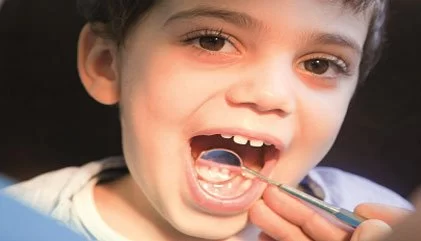
When is the Right Time for Children to Start Seeing a Dentist?
As a parent, one of the most important decisions you make for your child’s health is when to take them for their first dental checkup. Many parents, especially first-timers, often wonder when exactly their child should start seeing a dentist. I was once in your shoes, unsure of the right time and what to expect. It turns out that the timing of a child’s first dental visit is crucial for setting the foundation for a lifetime of healthy teeth and gums. Let me take you through the journey of understanding when to start your child’s dental care and why it matters so much.
Why Early Dental Visits Matter
From my own experience as a parent, I learned that it’s easy to overlook dental health in babies and toddlers. After all, they only have a few teeth at the beginning, and they’re still learning how to brush properly. However, early dental visits are essential for more than just getting your child used to the dentist. These visits are a proactive approach to preventing future dental problems.
The American Dental Association (ADA) recommends that children see a dentist by their first birthday or within six months of getting their first tooth. That might sound early, but it’s the perfect time to get a head start on oral health. A visit that early can help identify any early issues, such as thumb sucking, teething problems, or signs of tooth decay. It’s also a great way to begin teaching your child that visiting the dentist is a positive experience, which can help ease any fear later on.
What Happens During Your Child’s First Dental Visit?
When my son had his first dental visit, I was nervous about what to expect. I had heard horror stories about kids being afraid of the dentist, but I was pleasantly surprised by how calm and positive the experience turned out to be. During your child’s first visit, the dentist typically doesn’t perform any serious procedures. Instead, the focus is on introducing your child to the dental environment in a relaxed and friendly way.
Here’s what typically happens during that first visit:
- Gentle Check-Up: The dentist will perform a gentle examination of your child’s teeth, gums, and mouth. For infants, this often means checking the alignment of the teeth, looking for any potential issues, and giving advice about teething.
- Education for Parents: The dentist will provide valuable guidance on how to care for your baby’s or toddler’s teeth. This might include advice on proper brushing techniques, the use of fluoride, and how to avoid habits like thumb-sucking.
- Fluoride Varnish: If your child’s teeth have started to come in, the dentist may apply a fluoride varnish to help prevent cavities.
- Establishing a Routine: Most pediatric dentists aim to make this first visit a positive experience, setting the stage for future visits and creating a trusting relationship with both the child and the parents.
For me, seeing how my child reacted to the visit made all the difference. He was curious but calm, and we left the office with a few tips on how to take care of his tiny teeth. It really set the stage for a lifetime of healthy dental habits.
When to Schedule Follow-Up Visits
After the first dental visit, the next important step is establishing a routine for follow-up visits. According to the ADA, children should visit the dentist every six months starting at age 1. These regular visits are crucial for catching problems early before they become serious and to ensure that your child’s teeth are developing properly. For older children, the dentist will continue to monitor their teeth as their permanent teeth begin to come in.
During these visits, your dentist will also check for signs of dental decay, misalignment, or other issues that could affect your child’s ability to speak or eat. They’ll give you tips on how to ensure your child continues to practice good dental hygiene at home and may even suggest sealants to protect teeth from cavities.
The Importance of Good Dental Habits from an Early Age
As a parent, the habits you help your child form in their early years will stay with them for life. Encouraging proper oral hygiene at home is just as important as visiting the dentist regularly. I remember how challenging it was to get my child to brush his teeth at first. But the earlier you start, the easier it becomes. Here are a few tips I found helpful:
- Start Early: Begin cleaning your child’s gums with a soft cloth before their teeth even appear. Once the first tooth comes in, switch to a soft toothbrush.
- Make Brushing Fun: Use a small, soft-bristled toothbrush and a fluoride toothpaste. Let your child choose their toothbrush and toothpaste with fun characters on them, making the process exciting and engaging.
- Lead by Example: Children learn by imitation. Brush your teeth together to make it a shared experience.
- Limit Sugary Snacks: Try to limit sugary foods and drinks, especially before bedtime. Sugars feed the bacteria that cause cavities, and the bacteria grow stronger when left overnight.
Real-Life Example: A Parent’s Experience with Their Child’s Dental Journey
One story that sticks out to me is of my friend Laura, whose son Ben had a rough start with his dental visits. Ben was a bit older when he first went to the dentist, and he had a few cavities by the time he was three. Laura was devastated, not realizing that his love for sugary snacks was contributing to the problem. But after taking Ben to the dentist regularly and following the dental care tips, Ben’s teeth became healthier, and his cavity problems went away. Laura’s experience reinforced the importance of starting dental care early and making it a priority in the family routine.
Now, Ben looks forward to his dental appointments, and he’s proud to show off his healthy smile. It’s a reminder that while early dental visits are important, the habits you build at home are equally as crucial in ensuring your child’s oral health for years to come.
Taking your child to the dentist for their first visit can be an exciting and educational experience for both of you. By starting early, you are setting the stage for a lifetime of healthy smiles. So, don’t wait—schedule that first dental checkup as soon as your child’s first tooth emerges. It’s one of the best steps you can take to ensure they grow up with a healthy mouth and body.







 Cain Orthodontics, PC4.0 (95 review)
Cain Orthodontics, PC4.0 (95 review) Vaughn Family Dental- Jessica Vaughn, DDS4.0 (125 review)
Vaughn Family Dental- Jessica Vaughn, DDS4.0 (125 review) Chandler Dental Arts4.0 (715 review)
Chandler Dental Arts4.0 (715 review) Eric B Chandler Health Center: Moore Kirk W DDS3.0 (6 review)
Eric B Chandler Health Center: Moore Kirk W DDS3.0 (6 review) New Horizons Family Dental4.0 (114 review)
New Horizons Family Dental4.0 (114 review) Advanced Dentistry of Phoenixville4.0 (543 review)
Advanced Dentistry of Phoenixville4.0 (543 review) The Importance of Oral Health Education During Pregnancy for a Healthy Pregnancy
The Importance of Oral Health Education During Pregnancy for a Healthy Pregnancy Best Tips for Brushing Your Teeth Properly for Healthy Gums: Essential Techniques for Oral Health
Best Tips for Brushing Your Teeth Properly for Healthy Gums: Essential Techniques for Oral Health Why Skipping Dental Checkups Can Lead to Bigger Oral Health Problems
Why Skipping Dental Checkups Can Lead to Bigger Oral Health Problems Advantages of Porcelain Dental Restorations
Advantages of Porcelain Dental Restorations How Can Diabetes Cause Tooth and Gum Problems? Preventing and Managing Oral Health Issues
How Can Diabetes Cause Tooth and Gum Problems? Preventing and Managing Oral Health Issues Healthy Habits for Promoting Good Oral Health and Hygiene: Tips for a Healthy Smile
Healthy Habits for Promoting Good Oral Health and Hygiene: Tips for a Healthy Smile